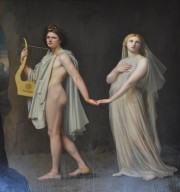|
Home
|
Jun 13, 2022
This week’s themeEponyms This week’s words Orphean Proteus eolian panderer chimeric 
Orpheus and Eurydice emerging from the underworld
Artist unknown Previous week’s theme British streets that became words A.Word.A.Day
with Anu GargMythology is my trusted mine for logos, that’s Greek for words. Characters from Greek mythology never disappoint. I tap on their shoulders and ask what they have been up to. The answer is not the usual: surfed the web, ordered pizza, watched Netflix. These gods, goddesses, monsters, and mortals have stories to tell. They share their capers -- and these are no run-of-the-mill shenanigans. Many of these mythical characters have become immortal in the language by having words coined after them. A word coined after someone is known as an eponym, from Greek epi- (upon) + -onym (name). This week we’ll meet five of the characters from Greek mythology and look at the words they have inspired. Have you ever coined an eponym after someone? Share below or email us at words@wordsmith.org (include your location: city and state). Google first to make sure someone else hasn’t come up with the same word earlier. Orphean
PRONUNCIATION:
MEANING:
adjective: 1. Melodious. 2. Enchanting. 3. In the manner of Orpheus’s journey to the underworld. ETYMOLOGY:
After Orpheus, a musician, poet, and prophet in Greek mythology. His
lyre-playing and singing could charm animals, trees, and even rocks.
After his wife Eurydice, a nymph, died of a snakebite, he traveled to
the underworld to bring her back. His music melted the heart of Hades, the god of the underworld, who
allowed him to take his wife back on the condition that
he not look back at her until they had reached the world of the living.
They had almost made it when he looked back and lost her again. His
mother Calliope/Kalliope has also given a word to the English language:
calliopean. Earliest
documented use: 1593.
USAGE:
“Orphean strains of lute music floated preposterously up on the stench.” Geraldine McCaughrean; Vainglory; Romaunce Books; 1991. “I had already made not one but several Orphean journeys. I had not yet accepted her loss.” Robin Jenkins; Childish Things; Canongate Books; 2001. A THOUGHT FOR TODAY:
The intellect of man is forced to choose / Perfection of the life, or of
the work, / And if it take the second must refuse / A heavenly mansion,
raging in the dark. -William Butler Yeats, writer, Nobel laureate (13 Jun
1865-1939)
|
|
Subscriber Services
Awards | Stats | Links | Privacy Policy
Contribute | Advertise
Awards | Stats | Links | Privacy Policy
Contribute | Advertise
© 1994-2026 Wordsmith